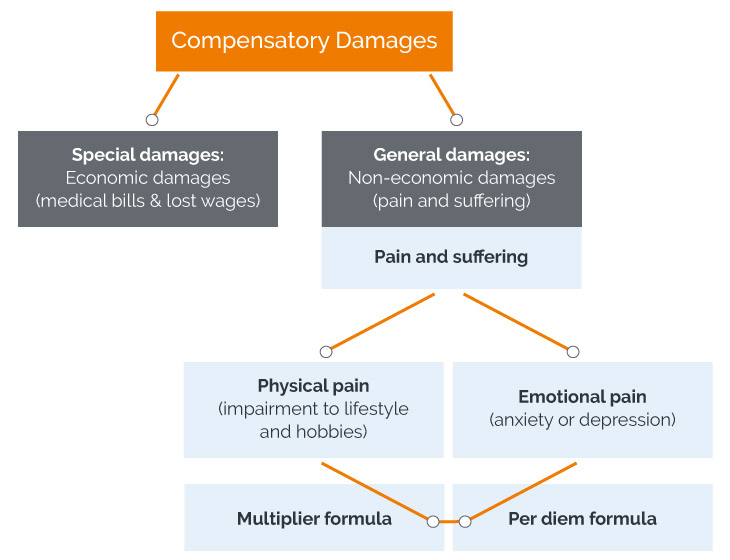
The bigger the injury, the larger the claim. Usually. See how to calculate medical treatments, pain and suffering, and more in a California personal injury lawsuit.
If you’ve been injured in an accident, you probably have a variety of concerns ahead of you.
If your injury requires extensive medical treatment, one of your first concerns is probably how you’re going to pay for all of it. The medical bills can make your head spin, so you want to figure out a plan to deal with the expenses associated with your injury.
Should you accept a settlement from the insurance company?
Unfortunately, the answer to this question is: It depends.
Before you accept any settlement offer, you should have an understanding of what the value of your claim is, and that can be tricky to determine.
If your injury was fairly minor and you’ve received all the treatment you’re going to require, you can likely calculate the value of your claim.
You’d add up the costs for:
- Medical treatment
- Lost wages or earnings
- Property damage
- Any other expenses associated with the injury
If you believe that you’ve already experienced all the financial loss that’s anticipated from the injury, you could accept a settlement in that amount from the insurance company.
If your medical expenses, lost work time, or other costs are likely to continue or increase, you need a settlement that covers not just the expenses you’ve already incurred, but also future expenses.
If that’s the case, you need to find a personal injury lawyer who can help calculate your future costs in addition to the ones that you’ve already counted. Don’t accept a settlement from the insurance company if you’re not sure about future expenses, or if you think it’s not enough. Once you sign an agreement to a settlement, you can’t go back for more.
What are damages?
Damages are the amount of money the court awards a plaintiff in a successful lawsuit.
If your injury is the result of someone else’s fault, negligence, or wrongful behavior, a personal injury lawsuit might be your best method to seek financial recovery.
One of your determining factors for whether or not to file a lawsuit might be how much you stand to gain in damages.
When you consult a personal injury lawyer, they’ll tell you that the objective is to reach a settlement with the defendant without going to trial. A trial is time-consuming, expensive, and can be emotionally draining. It’s a last resort if the parties can’t agree on whether the defendant bears liability or how much the case is worth.
Why is it so important to correctly calculate the value of your claim?
Correctly calculating the amount of your claim is one of the most important parts of the process. If you overstate your claim (ask for too much), the opposing party will believe that you’re not motivated to settle.
If you ask for too little, you shortchange yourself and aren’t going to get the amount you need to cover all of your expenses.
Types of personal injury damages in California lawsuits
All damages fall into two categories: compensatory and punitive.
- Compensatory damages are those that reimburse a plaintiff for losses associated with an injury. They’re intended to make the plaintiff “whole,” or return you to the situation you’d have been in if the injury hadn’t happened.Compensatory damages include both economic and non-economic damages. That means anything that has an associated dollar amount, like medical treatment, income, or property loss. It also includes non-economic damages like pain and suffering, emotional distress, or loss of consortium.
- Punitive damages are when the court decides that a defendant needs to be punished for the injury in a way that’s not just reimbursing the plaintiff for their losses. This is unusual and only happens in cases where the defendant’s behavior was especially outrageous. The purpose of awarding punitive damages is to deter the defendant from committing the wrongful act again, and also to deter or warn others from doing so.Punitive damages generally apply to defendants that are large corporations like pharmaceutical companies, automobile manufacturers, insurance companies (in bad faith cases), or similar.
How the insurance company evaluates your claim
Whether your injury was caused by a car accident, truck accident, slip-and-fall incident, or something entirely different, someone’s insurance is probably involved — either yours or the other party’s.
The insurance adjuster will use a formula to determine what amount to offer you as a settlement.
They’ll begin by adding the costs of the medical expenses, lost property, wage loss, and whatever else has a specific dollar amount, which are called special damages.
Then, they’ll look at general damages, which are losses that don’t have a specific cost attached.
Special damages are economic, and general damages are non-economic.

An insurance company’s goal is to pay out the least that it can on any claim. That’s how insurers make money. They can’t profit if they’re paying generous sums for every claim that’s reported. Instead, they look very closely at what’s included in your claim and try to give you exactly what they must in order to fulfill their obligation, and not a penny more.
Sometimes, they try to offer even less than what your claim is worth. If you think your insurance company is not meeting the terms of its obligation to you, it could be a case of insurance bad faith.
Calculating pain and suffering
Some states have a specific formula for determining what your pain and suffering is worth. California doesn’t have a clear method, but instead has two formula options:
- Multiplier formula: This method uses a number between 1.5 and 4 (or higher, in an extreme case) to multiply by the cost of your medical bills. You’re assigned a number based on the severity of your injury. A minor injury might be a 1.5, while a very severe injury with lasting effects could be a 4. That would be multiplied by your special damages in order to arrive at the amount you’re owed for pain and suffering.
- Per diem formula: This method would be used to calculate pain and suffering based on how much you suffer each day. For example, you might get a rate of $50 per day for your pain and suffering, and then it would be multiplied by the number of days it’s expected that you’ll experience the pain and suffering.
Other factors in calculating pain and suffering
If you’re the kind of person who likes to look at everything in a mathematical way, you might be out of luck in coming to a true calculation for what an award for pain and suffering could be. That’s because there are several unpredictable variables that can drastically change the outcome of your case.
For example, if your lawsuit goes to trial, the decision whether to award damages for non-economic injury, and how much they’ll be, will be up to the judge or jury.
Here are some ways that these damages are decided:
- Location. A jury is intended to represent your peers — the demographics and views of the community in which your case is tried. Whether it’s a large city, smaller town, North or South, the unique aspects to your community’s “personality” can determine whether a judge or jury will favor the plaintiff or defendant.
- Likability. Sometimes, it comes down to how likable or believable the plaintiff is, and the same for witnesses who take the stand. Is it fair? Maybe, maybe not. But it matters. If the jury feels sympathetic toward the plaintiff and can relate to the situation, they’re more likely to award more damages for pain and suffering.
- Credibility. Both parties’ trustworthiness matters in court. If you’ve exaggerated your injuries, the jury is likely to see through that and they’ll award you less in damages because they might not think you deserve more. It’s important to be truthful about the nature of your injuries from the beginning.
- Visible injury. If your injury has left you visibly impaired or scarred, it makes an impression. A jury might be more likely to award more damages if they can see your injuries, rather than hearing about them.
- Longevity of injury. An injury that will affect you for the remainder of your life will be more likely to result in an award for pain and suffering than one that was short-term.
Again, these are all subjective criteria, but they’re the reason why it’s important to hire a personal injury lawyer who has experience recovering awards for the type and size of your claim.
California comparative fault law
Just when you thought you had it all figured out, California throws a curveball: comparative fault.
If you’re calculating the value of a claim, it’s crucial to take into consideration whether your liability played any role in the accident or incident.
Even if the accident wasn’t your fault, California courts will evaluate whether you could’ve done anything to avoid or prevent the injury.
For example, say you were in a car accident. Although the other driver caused the accident, if it’s possible that you could’ve swerved or braked a moment sooner to prevent or avoid the collision, you could be found to have a small percentage of fault.
If that’s the case, the court would reduce your damage award based on that percentage. So if you’re found 5% at fault, the award is reduced by 5%.
How do I know if my lawsuit will be worthwhile?
That’s a question for your lawyer.
The general rule of thumb is that big injuries equal a big damage award. Clearly, there are a number of factors involved in calculating the value of your claim. If you want to try to establish a rough estimate, start by calculating the actual costs for your medical treatment, lost wages, and other therapies and services that you’ve paid for or know you’ll require in the future.
Next, find a personal injury lawyer who can help calculate future costs that might be uncertain, non-economic damages, and possible punitive damages. Look for a California personal injury lawyer who is experienced in handling lawsuits like yours, and also who has access to financial and actuarial experts to help calculate future expenses based on your life expectancy and level of need in order to get the recovery you deserve.
See our guide Choosing a personal injury attorney.
